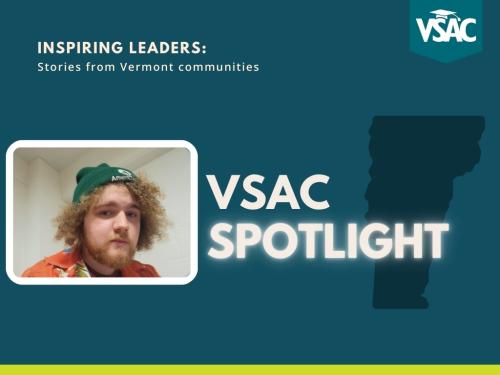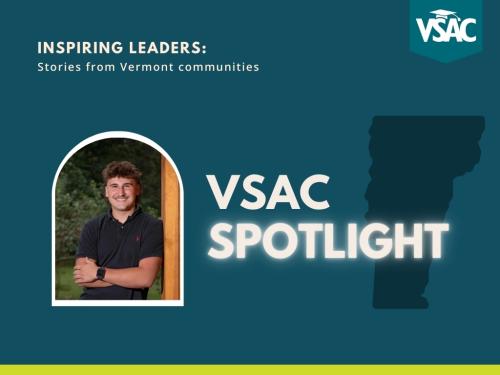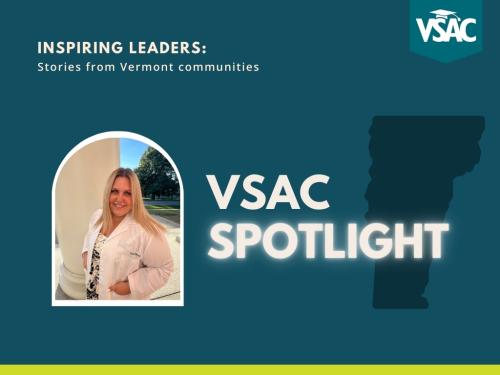VSAC will be closed Monday, February 16, 2026 in observance of Presidents’ Day.
For this Ugandan refugee, a truck-driving license paves the way for a bright future

When Uganda-born Geofrey Ssebugwawo decided to seek asylum in the United States, all he wanted was safety. “I grew up knowing that America respects and protects human rights,” he said. “That’s why I wanted to come here.”
While his journey to America, and to Vermont, was a long and arduous one — and his immigration status is not yet fully resolved — he’s achieved a major milestone: earning his commercial truck driving license. Thanks to the help of a half-dozen Vermonters who came together to see him succeed, Geofrey now has a high-paying trucking job that comes with a nice bonus: He’ll get to see his new country.
Geofrey left his native Uganda in 2019, arriving at the US-Mexico border by way of Ethiopia, Brazil, and Argentina. He waited at the border crossing for two weeks before he was admitted into the United States, and then spent a full year in a Texas detention center. “It was not a very nice place to be,” Geofrey said of the detention facility. Still, it was an improvement over his homeland. While Geofrey can’t discuss the details of his still-active asylum case, known human rights issues in Uganda include torture, kidnapping, imprisonment, and violence against journalists and dissenters.
Eventually, a Texas-based immigration organization connected Geofrey with a sponsor, Janet Givens of Danville, Vermont, and he was released from detention to await his immigration hearing. Janet is part of the Northeast Kingdom Asylum Seekers Assistance Network (NEKASAN) which supports asylum-seekers like Geofrey by raising money for their often-significant legal expenses, medical care, and other costs associated with establishing oneself in a new country, particularly a cold one like Vermont. Geofrey has been staying with Janet and her husband, Woody Starkweather, since August 2020.
“They’re like my family,” he said. “They’ve been there for me in every situation.”
When Geofrey, who worked as a diesel mechanic before he left Uganda, had the idea to pursue his CDL, Janet made some initial inquiries. She reached out to Caledonia County Senator Jane Kitchel, who suggested that Janet call VSAC. Marti Kingsley, who’s worked as an adult learning counselor with VSAC’s Employee Opportunity Center for many years, jumped on the case.
“The CDL was a great option,” she said. “It will give Geofrey economic stability and the ability to be out on his own and support his family.” Geofrey sends money home to his family whenever he can and said he plans to bring them over once he’s more established.
Marti helped Geofrey enroll in the high-demand CDL course and also connected him with the Vermont Department of Labor, Vocational Rehabilitation, and English Language Learners.
Janet said that if VSAC hadn’t been able to cover the cost of the course, NEKASAN would have raised the money to fund it. “But it would have meant that someone else, somewhere else, wouldn’t have been able to get what they needed. VSAC’s involvement with Geofrey helped a lot of people.”
“And it wasn’t just the money,” Janet continued. “Marti hooked him into resources that I didn’t know anything about, and she got him in doors that I hadn’t been able to get through earlier on. It was extremely important to us that he had VSAC behind him.”
On the first day of Geofrey’s CDL class, the students were given one hour to complete a 118-question assessment test.
“In order to understand it, I had to read each question two or three times. People were finished when I was on question 50,” said Geofrey. While his interim work with the owner of a local landscaping company, Aubrey Cabot-Case of Regenerative Garden Works out of Peacham, had greatly improved Geofrey’s English, his vocabulary was still limited. “I thought, ‘Wow, this is going to be hard.’”
While Geofrey wasn’t able to complete that first test in time, things got easier as the course continued and he started to master the technical vocabulary.
“The truck has 170-something parts, and you have to know how they work,” he said. While the mechanical concepts came easily to him, “Learning the terminology for all of these truck parts and being able to talk about them in a new language was very challenging. But everyone said to me, ‘don’t lose hope. Just continue. You’ll make it.’ That gave me courage.”
That courage paid off. Geofrey passed the final exam on the first try, when many others — all native English speakers — had to retake it. He took his driving test in December and passed with flying colors.
“Ever since I got that CDL, I see a bright future in front of me,” he said. “It’s something that I wanted to do, and now I feel like, ‘I’m good enough; I’ve got a job.’”
For Geofrey, the VSAC-funded CDL course was his gateway to the American dream.
“Here, people talk about ‘You want to be this,’ but we don’t have that in Uganda,” he explained. “Only those who have money go to school.” And even for those who have an education — as Geofrey received by working odd jobs from a very young age and his parents contributing when they could — the future is still very uncertain. “Here, the more you’re educated or experienced, the more you earn. Over there, that’s not the case,” he said, explaining that favoritism, not competence, governs who gets the opportunities.
Now that he’s earned his license, Geofrey is currently working on completing his training hours, where he’s paired with a more experienced driver. His work has taken him up and down the East Coast and even out to California. “I like that I’ll be busy, I’ll make good money, and I’ll be able to see America,” he said. “But I still want to come back to Vermont, because that’s my home now.”
For information on college and career planning and help with financial aid, go to www.vsac.org/FAFSAfirst and check out our online workshops and events. You can also give us a call at 800-642-3177, 8 a.m. to 4:30 p.m., Monday through Friday, and online at info@vsac.org.





